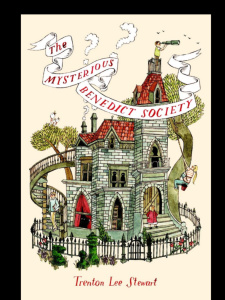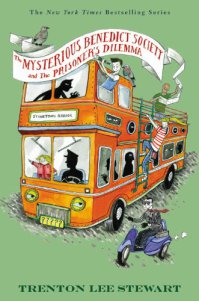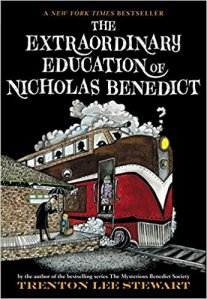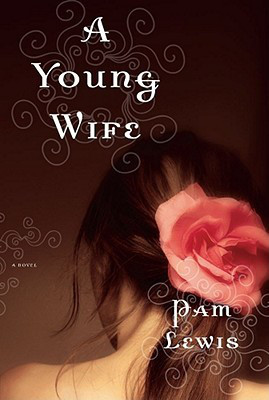I first read The Mysterious Benedict Society back in 2007, when it was first published. I can’t remember how I initially found it – probably browsing about the library – but I enjoyed it so much that I purchased it soon after. The fantastic cover art and interior illustrations drew me in, and the story was strong enough to make the read well worth it. Since then, I’ve read this book several times and enjoyed it more with each reading.

//published 2007//
Our story begins with Reynie, a boy whose parents died before he remembers, and who now lives in an orphanage. Reynie is basically a genius, incredibly intelligent and keen to learn. One day, he and his tutor are reading the newspaper – as they do most days – when they come across a rather odd ad: “Are you a gifted child looking for special opportunities?” Reynie responds, and soon finds himself involved in a series of tests – and then even more.
This is a children’s book, so much of the writing is rather simple. However, Stewart has not dumbed-down his story, which has a fabulous villain and lots of action. As an adult, I found small snippets of it to be verging on polemic, but in some ways I think the almost-spelling-out fits in with the age of the targeted audience. Don’t get me wrong, this isn’t a preachy book by any means. Reynie and the trio with whom he soon joins forces (The Mysterious Benedict Society – Sticky, Kate, and Constance) infiltrate a school for the gifted that may or may not be a mere cover for something much, much more sinister.
I love the bit where the kids are first entering the school. A couple of the older students, Jillson and Jackson, are showing them around.
“It sounds like there are no rules here at all,” Sticky said.
“That’s true, George,” said Jillson. “Virtually none, in fact. You can wear whatever you want, just so long as you have on trousers, shoes, and a shirt. You can bathe as often as you like or not at all, provided you are clean every day in class. You can eat whatever and whenever you want, so long as it’s during meal hours at the cafeteria. You’re allowed to keep the lights on in your room as late as you wish until ten o’clock each night. And you can go wherever you want around the Institute, so long as you keep to the paths and the yellow-tiled corridors.”
“Actually,” Reynie observed, “those all sound like rules.”
Jackson rolled his icy blue eyes. “This is your first day, so I don’t expect you to know much, Reynard. But this is one of the rules of life you’ll learn at the Institute: Many things that sound like rules aren’t actually rules, and it always sounds like there are more rules than there really are.”
And I do appreciate Stewart’s apt summation of government schools:
Rote memorization of lessons was discouraged but required; class participation was encouraged but rarely permitted.
All in all, The Mysterious Benedict Society is a fun and engaging story with relatable characters and a solid plot, yet also manages to be thoughtful at a level that is challenging for both its target audience of middle schoolers and older readers as well. I highly recommend it. 5/5.

//published 2008//

//published 2009//
The Mysterious Benedict Society and the Perilous Journey and The Mysterious Benedict Society and the Prisoner’s Dilemma are also enjoyable reads, but not quite as engaging as the first book. I hadn’t read these two as often as the first book, so I really enjoyed delving back into them. The entire cast of characters returns for these books as the pursuit of the villain from the first book continues. These two books lack the deeper level of the first book, but are still well-paced and fun stories, and a lot of the questions from the first book are answered. I would have appreciated a slightly more involved epilogue, but for the most part solid 4/5 reads.

//published 2012//
The final book, The Extraordinary Education of Nicholas Benedict is a prequel that looks at a formative season in the childhood of Mr. Benedict. This is actually probably my second-favorite of the four books. I really like that Nicholas isn’t a perfect kid, and his character development is done very well, especially the way that he learns to see that everyone has a motivation for what he does, and that understanding that motivation before passing judgment is an important part of life. Another 5/5.
Advertisements Share this:





